| Listing 1 - 8 of 8 |
Sort by
|
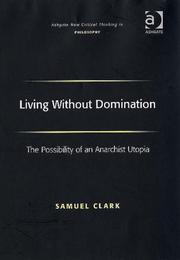
ISBN: 1317103874 1317103866 1281104418 9786611104412 0754684512 9780754684510 0754654613 9780754654612 9781317103875 9781317103868 9781281104410 6611104410 9781315592824 9781317103851 9781138275942 1315592827 Year: 2007 Publisher: Aldershot Ashgate
Abstract | Keywords | Export | Availability | Bookmark
 Loading...
Loading...Choose an application
- Reference Manager
- EndNote
- RefWorks (Direct export to RefWorks)
This book defends the bold claim that humans can organize themselves to live peacefully and prosperously together in an anarchist utopia. Clark refutes errors about anarchism, utopianism and human sociability and its history. He then develops an analysis of natural human social activity which places anarchy in the real landscape of sociability, along with more familiar possibilities including states and slavery.
Anarchism. --- Utopias. --- Ideal states --- States, Ideal --- Utopian literature --- Political science --- Socialism --- Voyages, Imaginary --- Dystopias --- Anarchism and anarchists --- Anarchy --- Government, Resistance to --- Libertarianism --- Nihilism --- Anarchism --- Utopias
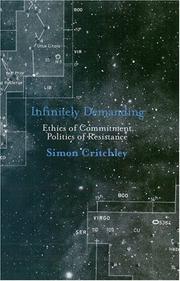
ISBN: 9781844671212 1844671216 Year: 2007 Publisher: London Verso
Abstract | Keywords | Export | Availability | Bookmark
 Loading...
Loading...Choose an application
- Reference Manager
- EndNote
- RefWorks (Direct export to RefWorks)
Anarchism --- Political ethics --- Ethics, Political --- Ethics in government --- Government ethics --- Political science --- Politics, Practical --- Anarchism and anarchists --- Anarchy --- Moral and ethical aspects --- Political philosophy. Social philosophy --- Professional ethics. Deontology --- Ethics --- Civics --- Government, Resistance to --- Libertarianism --- Nihilism --- Socialism
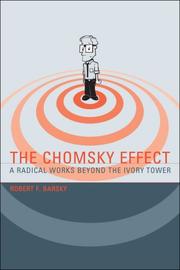
ISBN: 1282098969 9786612098963 0262267861 1435603095 9780262267861 9780262026246 0262026244 9781435603097 9781282098961 6612098961 9780262513166 0262513161 Year: 2007 Publisher: Cambridge, Mass. MIT Press
Abstract | Keywords | Export | Availability | Bookmark
 Loading...
Loading...Choose an application
- Reference Manager
- EndNote
- RefWorks (Direct export to RefWorks)
Noam Chomsky as political gadfly, groundbreaking scholar, and intellectual guru: key issues in Chomsky's career and the sometimes contentious reception to his ideas.
Liberalism. --- Anarchism. --- Political science --- Philosophy. --- Chomsky, Noam --- Influence. --- Criticism and interpretation. --- Political philosophy --- Anarchism and anarchists --- Anarchy --- Liberal egalitarianism --- Government, Resistance to --- Libertarianism --- Nihilism --- Socialism --- Liberty --- Social sciences --- LINGUISTICS & LANGUAGE/General --- SOCIAL SCIENCES/Political Science/Political & Social Theory --- Chomsky, Abraham Noam
Book
Year: 2007 Publisher: Washington, D.C., The World Bank,
Abstract | Keywords | Export | Availability | Bookmark
 Loading...
Loading...Choose an application
- Reference Manager
- EndNote
- RefWorks (Direct export to RefWorks)
Autocratic regimes are quite often short-lived kleptocracies formed and maintained through force and used to appropriate wealth from subjects. Some of these autocracies collapse after only a year or two of plundering while others manage to survive for 15 or 20 years. This paper asks why some autocratic regimes survive while others fail. A database of political regimes from 1960 to 2003 is introduced and accompanies the paper in an appendix. A model of political survival suggests that autocrats exchange constraints on their executive power for their continued survival. The relationship between payouts from successful rebellion and ease of rebellion determines how willing kleptocrats are to extend the political franchise and protect their power. Results show that extremely oppressive regimes and great expenditures on security are likely to accompany the most difficult environments for defense of the state. The model is used to identify the costs of pervasive political conflict and to decompose the "civil peace dividend" enjoyed by inclusive democracies that do not suffer from the malady of kleptocratic rule. Finally, the model suggests that slow democratization pushed by the autocratic elites to guarantee their survival, accompanied by stable development, may be the best path toward a democratic future for many fragile states.
Anarchy --- Autocracy --- Collective Action --- Conflict and Development --- Democracies --- Democracy --- Dictatorship --- Disarmament --- Dissidents --- Emerging Markets --- Extremism --- Governance --- Health, Nutrition and Population --- Parliamentary Government --- Peace --- Policies --- Political Authority --- Political Economy --- Political Institutions --- Political Power --- Political Science --- Political Systems --- Political Systems and Analysis --- Political Transitions --- Politics --- Politics and Government --- Population Policies --- Post Conflict Reconstruction --- Private Sector Development --- Rights
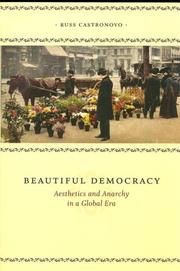
ISBN: 9786612069697 1282069691 0226096300 9780226096308 9780226096285 9780226096292 0226096289 0226096297 Year: 2007 Publisher: Chicago University of Chicago press
Abstract | Keywords | Export | Availability | Bookmark
 Loading...
Loading...Choose an application
- Reference Manager
- EndNote
- RefWorks (Direct export to RefWorks)
The photographer and reformer Jacob Riis once wrote, "I have seen an armful of daisies keep the peace of a block better than a policeman and his club." Riis was not alone in his belief that beauty could tame urban chaos, but are aesthetic experiences always a social good? Could aesthetics also inspire violent crime, working-class unrest, and racial murder? To answer these questions, Russ Castronovo turns to those who debated claims that art could democratize culture-civic reformers, anarchists, novelists, civil rights activists, and college professors-to reveal that beauty provi
Aesthetics, American. --- Arts --- Democracy --- United States --- Civilization. --- democracy, democratic, aesthetics, anarchy, american studies, civic reformers, anarchists, literature, literary, art, creativity, civil rights, activism, radical thinking, revolutionary, beauty, violence, violent, university lectures, riots, domestic terrorism, united states of america, usa, culture, urban photography, arts, citizenship, social transformation, jane addams, progressive era, history, historical, web du bois, william dean howells, charlie chaplin, internationalism. --- Aesthetics, American
Book
Year: 2007 Publisher: Washington, D.C., The World Bank,
Abstract | Keywords | Export | Availability | Bookmark
 Loading...
Loading...Choose an application
- Reference Manager
- EndNote
- RefWorks (Direct export to RefWorks)
Autocratic regimes are quite often short-lived kleptocracies formed and maintained through force and used to appropriate wealth from subjects. Some of these autocracies collapse after only a year or two of plundering while others manage to survive for 15 or 20 years. This paper asks why some autocratic regimes survive while others fail. A database of political regimes from 1960 to 2003 is introduced and accompanies the paper in an appendix. A model of political survival suggests that autocrats exchange constraints on their executive power for their continued survival. The relationship between payouts from successful rebellion and ease of rebellion determines how willing kleptocrats are to extend the political franchise and protect their power. Results show that extremely oppressive regimes and great expenditures on security are likely to accompany the most difficult environments for defense of the state. The model is used to identify the costs of pervasive political conflict and to decompose the "civil peace dividend" enjoyed by inclusive democracies that do not suffer from the malady of kleptocratic rule. Finally, the model suggests that slow democratization pushed by the autocratic elites to guarantee their survival, accompanied by stable development, may be the best path toward a democratic future for many fragile states.
Anarchy --- Autocracy --- Collective Action --- Conflict and Development --- Democracies --- Democracy --- Dictatorship --- Disarmament --- Dissidents --- Emerging Markets --- Extremism --- Governance --- Health, Nutrition and Population --- Parliamentary Government --- Peace --- Policies --- Political Authority --- Political Economy --- Political Institutions --- Political Power --- Political Science --- Political Systems --- Political Systems and Analysis --- Political Transitions --- Politics --- Politics and Government --- Population Policies --- Post Conflict Reconstruction --- Private Sector Development --- Rights
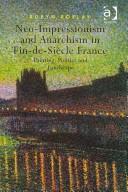
ISBN: 9780754657118 0754657116 Year: 2007 Publisher: Aldershot Ashgate
Abstract | Keywords | Export | Availability | Bookmark
 Loading...
Loading...Choose an application
- Reference Manager
- EndNote
- RefWorks (Direct export to RefWorks)
Political philosophy. Social philosophy --- Art styles --- Painting --- anno 1800-1899 --- France --- Neo-impressionism (Art) --- Landscape painting, French --- Anarchism --- Art --- Néo-impressionnisme (Art) --- Peinture de paysages française --- Anarchisme --- History --- Political aspects --- Histoire --- Aspect politique --- neo-impressionisme --- anarchisme --- fin de siècle --- politiek --- geschiedenis --- landschappen --- 19de eeuw --- Frankrijk --- Parijs --- Néo-impressionnisme (Art) --- Peinture de paysages française --- Art, Occidental --- Art, Visual --- Art, Western (Western countries) --- Arts, Fine --- Arts, Visual --- Fine arts --- Iconography --- Occidental art --- Visual arts --- Western art (Western countries) --- Arts --- Aesthetics --- Anarchism and anarchists --- Anarchy --- Government, Resistance to --- Libertarianism --- Nihilism --- Socialism --- Landscape painting --- Divisionism --- Pointillism --- Art, Modern --- Dots (Art) --- Impressionism (Art) --- Painting, Modern --- Art, Primitive --- neo-impressionisme. --- anarchisme. --- fin de siècle. --- politiek. --- geschiedenis. --- landschappen. --- 19de eeuw. --- Frankrijk. --- Parijs.
Book
ISBN: 9782847884395 Year: 2007 Publisher: ENS Éditions
Abstract | Keywords | Export | Availability | Bookmark
 Loading...
Loading...Choose an application
- Reference Manager
- EndNote
- RefWorks (Direct export to RefWorks)
In October 1842, the young Russian émigré Mikhail Bakunin published “Reaction In Germany” in Arnold Ruge’s German Annals. This brilliant and brash contribution to the debates of the Hegelian Left uses Hegel’s Logic as a logic of conflict which excludes all forms of external mediation between the opposing parties of Reaction and Revolution. Several months later, the article “Communism” marked Bakunin’s complete break with the philosophy. Written as last-ditch philosophical attempts to formulate a departure from the philosophy which now came across as an abandonment of theory for practice, his two letters to Arnold Ruge in 1843 explained what distanced Bakunin from German philosophy, including the Hegelian Left of which he had recently been a member. These texts are published in their entirety for the first time and in a translation which justifies their inclusion in the Young Hegelian tradition. With their accompanying commentary, they shed new light on the Young Hegelian School. Additionally, they offer a radical vision of conflictuality and the philosophical basis for a revolutionary stance. Finally, they provide a valuable record of the early intellectual and political journey of a revolutionary who was to shape his century.
Political science--Philosophy --- Anarchism --- Influence (Literary, artistic, etc.) --- Bakunin, Mikhail Aleksandrovich, --- Hegel, Georg Wilhelm Friedrich, --- Influence. --- Artistic impact --- Artistic influence --- Impact (Literary, artistic, etc.) --- Literary impact --- Literary influence --- Literary tradition --- Tradition (Literature) --- Art --- Influence (Psychology) --- Literature --- Intermediality --- Intertextuality --- Originality in literature --- Anarchism and anarchists --- Anarchy --- Government, Resistance to --- Libertarianism --- Nihilism --- Socialism --- Hegel, Georg Wilhelm Friedrich --- Hēgeru, --- Hei-ko-erh, --- Gegelʹ, Georg, --- Hījil, --- Khegel, --- Hegel, G. W. F. --- Hegel, --- Hei Ge Er, --- Chenkel, --- Hīghil, --- הגל, --- הגל, גאורג וילהלם פרידריך, --- הגל, גיאורג וילהלם פרידריך, --- הגל, ג.ו.פ, --- היגל, גורג ווילהלם פרדריך, --- היגל, גיורג וילהלם פרידריך, --- 黑格尔, --- Hegel, Guillermo Federico, --- Hegel, Jorge Guillermo Federico, --- Heyel, Georg Wilhelm Friedrich, --- Higil, Gʼūrg Vīlhim Frīdrīsh, --- هگل, --- هگل، گئورگ ويلهم فريدريش, --- Bacunin, --- Bacunin, Michal, --- Bakoenin, Michael, --- Bakounine, Michael, --- Bakounine, Michel, --- Bakounine, Michele, --- Bakunin, --- Bakunin, M. --- Bakunin, Michael, --- Bakunin, Michail, --- Bakunin, Miguel, --- Bakunin, Mikhail, --- Bakunyin, Mihail, --- Pa-kʻu-ning, --- Бакунин, Михаил Александрович, --- באקונין, מ., --- באקונין, מיכאאל, --- באקונין, מיכאאיל, --- בקונין, מיכאיל אלכסנדרוביץ, --- école jeune hégélienne
| Listing 1 - 8 of 8 |
Sort by
|

 Search
Search Feedback
Feedback About UniCat
About UniCat  Help
Help News
News